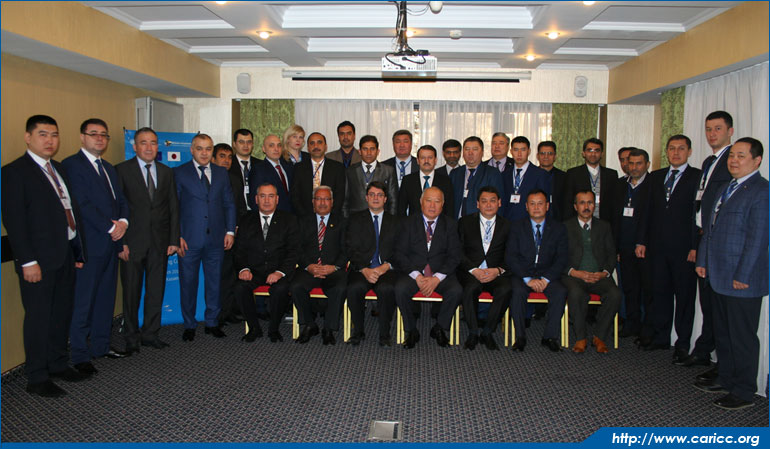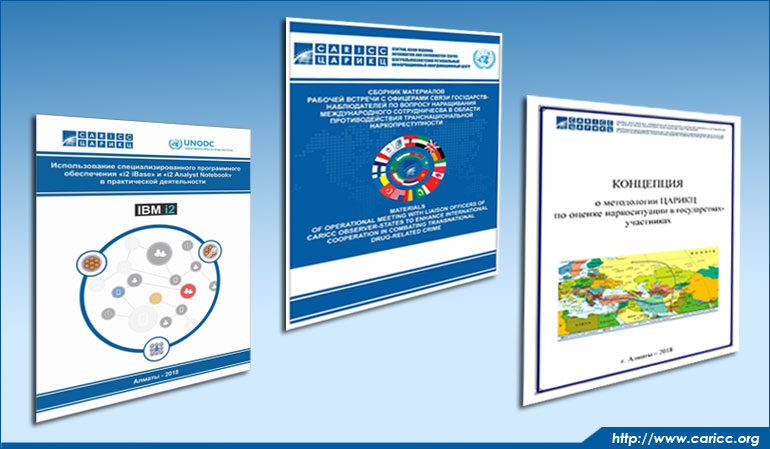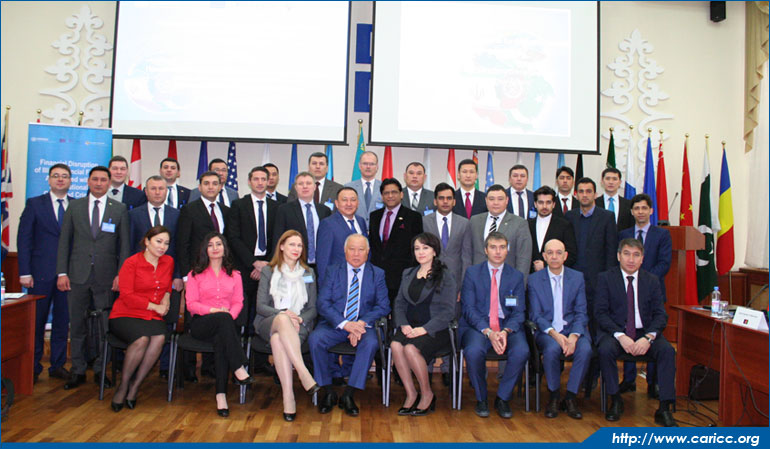Public version of report on activities of CARICC for 2018
Unofficial translation
Three long-term anti-drug operations “Substitution”, “Reflex” and “Lion Fish” were carried out in 2018 as part of the implementation of the CARICC mandate to assist in organizing, conducting and coordinating concerted joint international operations to combat drug trafficking.
Under operation “Substitution” in March 2018, its active Phase-2 was carried out under coordination of the UNODC Regional Office in Central Asia (Tashkent). The Centre house headquarters for coordinating operations in 5 Central Asian states. A report was presented according to results of the operation in July 2018 in Bishkek.
Results of the regional operation “Reflex-2018” indicate an increase in the number of NPS seizures in CARICC member states compared to 2017.
CARICC took part in the Interpol “Lion-Fish” global operation conducted in September-October 2018. The Centre served as a regional coordination headquarters for the CARICC State Parties. During the operation participants seized a total of more than 55 tons of drugs.
CARICC provided assistance in 10 short-term anti-drug operations in 2018, of which 6 were successfully implemented. At the same time, about 246.5 kg of drugs of Afghan origin were seized, including: 84 kg of heroin, 73 kg of opium, 89.5 kg of hashish, 10 suspects of involvement in illicit trafficking, including 1 citizen of the Republic of Tajikistan, 2 - the Russian Federation, 2 - the Islamic Republic of Afghanistan and 5 citizens of the Republic of Turkey.
Extensive work was carried in preparation for organization of a regular training controlled supply of Afghan drugs from Central Asia a country of Western Europe.
Following results are available on the information and analytical work of CARICC.
A concept on the CARICC methodology for assessing drug situation in its participating States was developed and agreed on by the CARICC member states.
16 information and analytical bulletins were prepared on various aspects of combating illicit trafficking of narcotic drugs, psychotropic substances and their precursors, disruption of economic foundations of drug-related crime, drug trafficking schemes via the Internet, and opium production in Afghanistan.
Based on the study of experience of competent authorities of Afghanistan, China and Iran, recommendations have been developed in the field of countering clandestine drug labs.
A comparative analysis of data for 2017 opposed to 2016 provided by the Counter Narcotics Police of the Ministry of Interior Affairs of Afghanistan was conducted in order to determine trends in production and seizure of opiates in Afghanistan.
An analysis of information on cases of interdiction of drug supplies along the Balkan and southern Afghan opiate traffic route was conducted to determine factors indicating a possible reorientation of Afghan drug supply channels.
With the financial support of the UNODC Border Interaction Component, a printed edition of the Methodological Guidebook on the Use of Database in Working with the IBM i2 Analytical Software was released.
In April 2018, a CARICC Regional Program on Systemic Fight Against Organized Drug Crime by Weakening its Financial Resources was launched at a working meeting of representatives of national coordinating bodies and financial intelligence units of CARICC participating states with attendance of EAG experts and the European Union.
An international conference on countering transnational drug crime was organized in March 2018 at the CARICC as part of the UNODC initiative on inter-network cooperation. During it, the Centre presented recommendations on informal operational procedures for interaction between international and regional focal points and other related organizations.
In October 2018, a regular working meeting with liaison officers of observer states and representatives of CARICC member states was organized at CARICC. Following the meeting, an agreement was reached on provision of list of banned amphetamine-type stimulants and NPS from observer states, as well as results of forensic chemical examinations of synthetic drugs for subsequent inclusion in a database created by the Centre.
In terms of operational analysis in 2018, 22 requests were received from competent authorities of CARICC member states, observer states and CARICC partners. The Centre proactively prepared 127 requests, for which 35 responses were received.
In the reporting period, the DIR “Subscriber” was established to organize check of telephone numbers, information on which was provided by a number of competent organizations of observer states at CARICC.
In cooperation with the National Security Committee of the Republic of Kazakhstan and the United States DEA, the Centre analyzed data provided on transit crossing of the state border of the Republic of Kazakhstan by citizens of Latvia, Lithuania, Poland, Ukraine and Estonia in 2015-2018. This analysis aroused great interest among the National Security Committee of Kazakhstan to existing analytical capacity of the Centre.
No failures were reported in the work with the Centralized Data Base (CDB) of CARICC during the reporting period. In 2018, 10,859 objects were created in the CDB, of which 1759 cases related to drug-related crimes by competent authorities, and information from open sources - 3870 objects. In general, during the reporting period, the amount of information introduced into the CARICC CSB increased by 18%, exceeding 70 thousand information objects.
Information on 1058 people was entered into the database of the CARICC official website for wanted persons, 93 of them - by the Ministry of Internal Affairs of Tajikistan, 880 - the Ministry of Internal Affairs of Russia and 85 - DEA USA. in relation to 2,391 persons wanted (according to information provided by the Republic of Azerbaijan - 4; Republic of Kazakhstan - 65; Kyrgyz Republic - 121; Russia - 880; Republic of Tajikistan - 354; Turkmenistan - 2; Republic of Uzbekistan - 80; USA DEA - 873; UK NCA - 12).
As part of implementation of a set of measures to create an information and communication system for CARICC, working meetings were held with officers of the DPN of the MIA of RK, and existing architecture of information system of the Centre and the DPN of the MIA of RK were discussed, as well as technical task of the project, analysis and evaluation of technical capabilities for compatibility and identity of communication systems.
In order to consolidate efforts of international and regional organizations in the region and minimize costs of activities, a virtual hub on information exchange on planned activities was created at CARICC, which is available at http://events.caricc.org.
An autonomous electronic database on revealed methods of concealing drugs has been created. It contains information on drug concealment, accompanied by photos, in the amount of 324 entries.
In order to modernize and expand technical capabilities of the official website of CARICC, general information layout of CARICC was implemented on a test platform on a new platform, and a “closed part” of the website was created that would restrict access to certain content to unauthorized users.
148 information messages and articles on the subject of the fight against drugs were posted in mass media and on the website of the Centre.
In 2018, registration was made and the CARICC page was created in the social network “Twitter”. As of December 31, 2018 the number of subscribers is 20 people, 98 tweets are published. On the social page of the Centre on Facebook, 150 informational messages were published, the number of subscribers is 351 users.
In the area of improving regulatory framework of CARICC, in 2018, three meetings of a working group of experts from CARICC member states were organized:
- July 30-31 - on a draft Agreement between the CARICC member states on the exchange and protection of secret information;
- August 1 - on draft CARICC Budget Rules;
- September 18 - on a draft new version of Regulations on Service in CARICC.
Materials of the meetings of working group of experts were sent to State Parties for further coordination of drafts.
Another work aimed at improving regulatory legal framework of CARICC was preparation and implementation of regulatory documents in pursuance of UNODC recommendations.
According to the CARICC director’s order No. 34 of November 26, 2018, the Strategy for Sustainability of CARICC was approved, in which risk management methodology consisting of step-by-step processes is set out in separate sections: 1. identification of risks and their description; 2. risk analysis; 3. identification of risk response actions; 4. monitoring implementation of risk response measures; 5. monitoring effectiveness of risk response actions; 6. risk management adjustments, risk checklist and action plan for responding to risks and ensuring sustainability of CARICC.
In the area of consolidating standard operating procedures following were approved:
- Procurement Guidelines at CARICC (CARICC director’s order of No. 4 of February 2, 2018), according to which 21 meetings of the Procurement Commission were held in 2018;
- CARICC Administrative rules (CARICC director’s order No. 19 of August 9, 2018), defining procedure for compensation of official and travel expenses;
- Instructions on use of official vehicles (CARICC director’s order No. 9 of February 22, 2018).
One meeting of the Council of National Coordinators (CNC) of CARICC State Parties was held in 2018.
CNC by its decision of September 20:
- granted observer status at CARICC to the Gulf Cooperation Council’s Criminal Intelligence Center to Combat Drugs (GCC-CICCD); and authorized head of CARICC to sign the Memorandum of Understanding between CARICC and GCC-CICCD;
- instructed CARICC to send a draft Agreement on cooperation in the fight against transnational drug crime between SELEC and CARICC for additional negotiation to CARICC member states;
- decided to hold additional meetings of EWG to review and prepare draft Agreements between CARICC member states on the exchange and protection of secret information, the CARICC Budget Rules and a new revision of Regulations on Service in CARICC for submission to the CNC;
- established an interim committee to review materials of candidates for vacancies of deputy director of CARICC, to conduct interviews with them and provide a report to the CNC;
- instructed the CARICC, in cooperation with foreign affairs agencies of the State Parties and the UNODC, to consider the letter from the NCDC under the Cabinet of Ministers of the Republic of Uzbekistan No. 05-828 of September 8, 2018, and provide an opinion on:
- admissibility of reference in clause 5 to clause 17 of the Regulations on CARICC;
- possible technical error.
Corresponding NVs and letters on decision of CNC-14 were sent to the State Parties.
Questions about consideration of request of Afghanistan to join the Agreement on the Establishment of CARICC, procedure for Turkey’s accession to this Agreement were removed from the agenda at an expert meeting on the preparation of meeting of the CNC in connection with a position of the Tajikistan side. The question of approving a financial controller for CARICC was removed from the agenda of the meeting of the CPC in connection with the position of the Kazakhstan side.
In the area of international cooperation, procedure for coordination of the CARICC Memorandum of Cooperation with Member States of the Joint Planning Cell (JPC) of the Triangular Initiative of the Islamic Republic of Afghanistan, the Islamic Republic of Iran and the Islamic Republic of Pakistan has been completed.
The Gulf Cooperation Council’s Criminal Information Center to Combat Drugs was granted observer status at CARICC.
Concerning Turkey’s request to join the Agreement on the Establishment of CARICC, a consensus has been reached among the CARICC member states. The accession procedure is agreed with all states except Tajikistan.
As a result of active measures taken by CARICC, including during an April visit of CARICC director to Afghanistan, in early June CARICC received an NV from the IRA Embassy to the Republic of Kazakhstan to consider membership of Afghanistan at CARICC with an NV from the Ministry of Foreign Affairs of the Republic of Kazakhstan on support by the Kazakh side of this request. By the meeting of the CNC on September 20, all states except RT supported the request of Afghanistan.
A draft Agreement on cooperation in the fight against transnational drug-related crime between SELEC and CARICC has been coordinated with the Republic of Azerbaijan, the Republic of Kazakhstan, the Kyrgyz Republic and the Republic of Tajikistan. The Russian Federation provided suggestions and comments regarding reformatting the draft Agreement into an international non-contractual act, excluding from its text legally binding provisions as well as language inherent in international treaties. Answers from Turkmenistan and the Republic of Uzbekistan were not received.
With regards to financial and logistical support, a number of tasks were carried out for the first time in 10 years of the existence of CARICC, namely:
- renovation of the roof above the conference hall and facade of the building with the installation of an electrical heating system for the storm and sediment sewerage of the roof of the building;
- replacement of official vehicles;
- equipment of premises in accordance with requirements of organization of secret office work;
- maintenance of fire alarm systems and purchase and refilling of carbon dioxide and powder fire extinguishers;
- preventive testing of electrical equipment and electrical installations of the building.
CARICC
http://www.caricc.org









